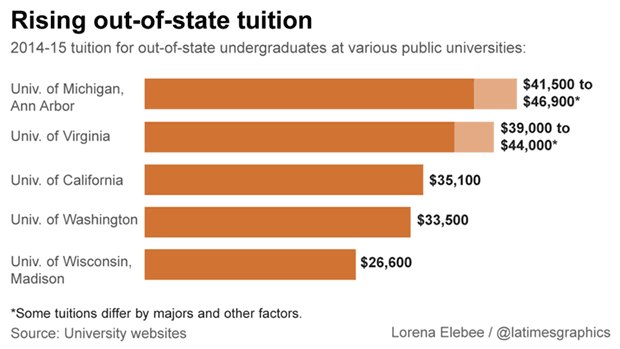Should UC system’s out-of-state students pay even more?

By Larry Gordon
Pennsylvania resident Amy Shao enrolled at UCLA last year knowing that she would pay a steep $23,000 more for tuition than her classmates who grew up in California. But with a lot of help from her parents, large loans and some federal grants, she has managed to pay her UC bills.
However, she and other students from other states and countries are alarmed by proposals to hike their tuition by as much as $5,000 next year. Shao acknowledges that Californians who paid state taxes for years deserve to pay lower fees than those from other states, but she says she fears the gap may become prohibitive for other students from across the nation and world.
“The accessibility level is going to be much lower,” she said. “These students who are qualified and intelligent and hardworking are not going to have the financial ability to go to UC, and that’s going to be unfortunate,” she said.
Students like her are at the center of a debate rumbling through the 10 UC campuses and Sacramento’s legislative halls. Beyond the controversy of whether UC enrolls too many out-of-state students, the question focuses on how much tuition they should pay.
UC students from other states and nations now are billed about $35,100 in tuition: the basic $12,200 that in-staters pay plus a $22,900 premium. That does not include room, board and some special campus fees.
When state support for higher education began dropping significantly five years ago, UC campuses — particularly UC Berkeley and UCLA — expanded the numbers of nonresidents to replace the funds. The system receives about $400 million a year from those out-of-state tuitions.
Some legislators and analysts are asking whether $35,200 is enough, particularly if UC starts to cap the number of those students. Should they pay $40,000, as some state legislators propose, to subsidize keeping tuition for Californians flat for a fourth consecutive year? At what point would large tuition increases scare off potential students from, say, Texas or India? Or is UC’s brand so powerful that it won’t lose students if its price matches the most expensive public universities elsewhere and even gets close to tuition at prestigious private schools?
“The question is what the market can bear,” said Sandy Baum, an expert on college pricing who consults for the College Board and is a research professor at George Washington University. “Depending on what the demographics of the students are, certainly there is some price at which they wouldn’t come.”
Proponents of such hikes say UC could match the University of Michigan’s Ann Arbor campus, where out-of-state tuition ranges from about $42,000 to $47,000 depending on majors and other factors, and the University of Virginia, where it ranges from about $39,000 to $44,000. UC’s out-of-state rates already surpass, for example, those of the University of Wisconsin, the University of Washington and the University of Arizona.
Daniel J. Hurley, director of state relations and policy analysis at the American Assn. of State Colleges and Universities, says he does not think UC would lose many students, especially foreign ones, if it went that high.
“I do think, for better or worse, that there is a market demand for American higher education. And the name brand of the UCs of the world is strong, especially in Asia,” he said.
In a bargaining point with Gov. Jerry Brown and the Legislature, UC President Janet Napolitano has proposed raising tuition for all UC students, Californians and others, by as much as 5% in each of the next five years if state funding does not increase significantly. In a worst-case scenario, that would mean tuition of $15,564 for Californians and $44,766 for out-of-staters by the 2019-20 school year.
In response, legislators have proposed plans to freeze in-state tuition, increase the number of California students and cap the ranks of nonresidents while hiking their tuition. State Assembly Speaker Toni Atkins (D-San Diego) proposes increasing tuition for nonresidents by $5,000 next year; state Senate Democrats, led by President Pro Tempore Kevin de León (D-Los Angeles), suggest a $4,000 rise next year.
UC would still be a “good bargain,” state Senate Education Budget Subcommittee Chairman Marty Block (D-San Diego) said at a news conference last month. “When students come from other states and from other countries to California, I think they are less concerned about the bargain than they are about the quality of education, and no place has higher quality of education than the University of California,” Block said.
Critics argue otherwise and note that non-Californians — who make up 20% of freshmen systemwide and about 30% at UCLA and UC Berkeley — are not eligible for most UC financial aid, although they can receive federal and private aid.
At a recent UC regents meeting, UC Davis Chancellor Linda P.B. Katehi said the legislators’ proposals for nonresidents’ tuition would make it harder to recruit students from outside California and make life more difficult for them. Particularly for graduate students, she said, “this is going to be devastating.”
UC Berkeley senior Nathan Duncan, who grew up near Philadelphia, could have attended Penn State and saved a lot of money. But the engineering major says he felt drawn to UC and the proximity to Bay Area job possibilities. He says he understands why Californians are charged lower tuition, but thinks that the current $23,000 surcharge for non-Californians is excessive and that it feels as if “you are being punished for being born to parents who didn’t live in California.”
If it had been significantly higher a few years ago, he would not have been able to attend UC, Duncan said. However, he concedes that UC Berkeley and UCLA probably won’t have trouble finding enough nonresidents at higher prices since, he says, the campuses “still command a real allure.”
[Source]: LA Times


